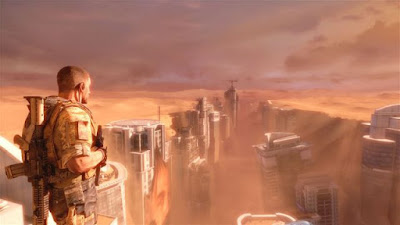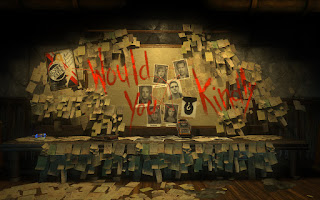Looking Back at the Mass Effect trilogy - Part Three
Mass Effect 3
After
being happy to find out ME2 had aged well and is still a masterpiece, I was
eager to see how the third act had fared being the black sheep out of the
three. Back in 2012 the fan and critical reaction to Mass Effect 3’s ending was
extraordinarily controversial. Criticisms were so loud that it actually forced
EA and Bioware to add extra cut scenes to the ending (which I had never
actually seen until replaying it recently) as free DLC, but nevertheless the
controversy has stained ME3’s reputation ever since (more on the ending later
though.)
Mass Effect 3 starts of on a drastically urgent note with an army of
Reaper dreadnoughts invading Earth, blowing up evacuation shuttles, buildings
and people right in front of Shepard. It gets increasingly effective with a
solemn piano theme swelling up as an escaping Shepard looks down at a dying
child he failed to save. It sets the tone for the entire game, and just like
the last two games, it’s up to Shepard to stop the Reaper threat. The rest of
the game revolves around Shepard trying to unite the galaxy against the
Reapers, a seemingly impossible task since half the galaxy is at war with
themselves, and if the world building of the past two games has taught us
anything is that just like in real life, these races can’t forget generations
of conflict.
This adds a new level of progression to the game as now you have a ‘War
Assets’ meter that you need to fill to a certain level to be able to take on
the Reapers. This means that almost every
choice you make doesn’t just have story/character consequences but either add
or detract from your War Assets bar.
At
its best this adds new depth to decision making: a choice might me ethically
corrupt but will add to your War Assets immensely. The highlight example being
one of the game’s set pieces on Tachanka, the krogan home world. They agree to
join the war as long as Mordin administers the genophage cure, but the salarian
government wants you to stop Mordin and explains the krogan won’t know the
difference. Meaning by betraying the krogan and murdering Mordin you’ll have
two fleets behind you but the genophage, which has been explored thoroughly
throughout the trilogy, will be intact. Usually however, the War Assets bar is
just an excuse to shoehorn in fetch quests and side activities.
ME3 takes the new third person shooter focus
of the last game and fully embraces it. ME3 is a full on action game and I
loved it for that. Combining special abilities in a three-man squad has never
felt cooler in the series; powers visually pop and finding exactly the right
combo of three abilities is delicious. Trapping a group of enemies in a gravity
well, freezing them into ice only to slam them into the ground and watch them
shatter is immensely satisfying. And no matter what three combinations of party
members you bring with you on a mission, the results are similarly extravagant.
Guns also feel even better then before with an interesting mechanic that
shortens the cooldown timer of your abilities the less weapons you carry. The
only real downside to ME3’s combat and gunplay is that unlike ME2 you can’t
carry around a heavy weapon in your arsenal, which is a shame because ME2 was
at its most creative when experimenting with these over the top weapons.
Speaking of squad members this time around your crew has shrunk somewhat
from ME2’s cast of 10, to 6, not including the pre-order bonus character EA
obviously included. This isn’t a deal-breaker but just a disappointment.
There’s only one entirely new character in your crew James, who isn’t
particularly deep and has nowhere near the amount of emotional baggage that
some of Mass Effect’s best characters have. His frequent use of “loco” in
reference to Shepard is cute and he’s overall an enjoyable character but in a
game with almost half the amount of party members as the previous game, James
can’t help but seem non-essential.
EDE
the ship’s AI from the previous game manages to get herself a sexy robotic body
and becomes an actual character as she struggles with concepts like free will,
jokes and even love as you can encourage or stop a relationship between her and
the human pilot, Joker, another character I haven’t mentioned but is frequently
a comedic standout through all three games. Liara and either Ashleigh or Kaiden
(depending on who you chose to save in the first game) also make a comeback to
your crew and both are even more interesting a second time around especially if
rekindling a relationship from the first game. Liara in particular has a couple
of incredible moments including one where she comes to your room to show off a
device to that’ll explain the Reaper threat to civilisations in the next 50,000
years, just in case we lose. Part of what she needs help with is what to put in
about Shepard, which makes it a really effective moment as you think about what
kind of character you’ve created Shepard to be and an introverted look at his
legacy.
The
only two ME2 characters to return to your crew are Tali and Garrus (who were
also the returning characters from the original Mass Effect.) Garrus doesn’t
get too much to do storywise, but like always he has a few great moments. It’s
really Tali who gets her most dramatic moment in the trilogy. The quarian/geth
conflict comes to a climax as the two are in the middle of a war that Tali was
opposed to after meeting Legion in the previous game. As the two fleets are
murdering each other in the sky Shepard needs to choose whether to let Legion upgrade
the geth and murder the quarians or stop him and let the reverse happen. I
remembered the first time I came to this decision I let the quarians die and
Tali killed herself. I has that at the back of my mind the entire way leading
up to this moment, but the last few missions show you the inside of the geth
infrastructure, their minds and almost their city. One of the things you see
are Legions memories, how quarians began to massacre the geth and even kill quarians
that were against the genocide. Some geth only began fighting back to protect
their quarian masters. So as the music swelled and Tali begged for her people I
couldn’t in all good consciousness condemn the geth to death for a conflict
that they didn’t begin, just a conflict that they won. Thankfully I must have
done something differently in lead up to the moment because I was given an
extra choice to convince both fleets to stop and as a result the quarians began
to live on their home world for the first time in generations and the geth were
helping them. Tali even admits that with their expertise and manpower
(robotpower?) the quarians were adapting to the environment and moving in years
faster then they would have otherwise. It’s another jaw dropping show of what
Mass Effect was able to accomplish with three games of careful and meticulous
world building and character development, to make me care so much about a
galaxy that I wouldn’t be around for much longer.
Even though only two ME2 party members come aboard the crew for the
third game, the rest of them all still make appearances (as long as they
survived the suicide mission.) Most of these are glorified cameos and only a
few playing slightly bigger roles. Miranda, Mordin, Legion and Thane are the
only ones to have anything substantial to do in the main story while the rest are
sidelined to optional missions. Thane’s death scene is depressing and
fulfilling in all the right ways it’s sad that the rest of the cast are shelved
especially if you put in time to create a relationship with one of them in the
previous game, not to mention it’s just a terrible waste of incredible
characters.
Now,
about that ending. This was a situation that has the entire community in an
uproar; Mas Effect was a series about choice and consequence, sometimes grand
and sometimes granular, but the ending, at launch, ignores every decision
you’ve ever made. It all essentially boils down to choosing one of three
scenarios: destroying robotic life including the Reapers, geth and EDI;
controlling the Reapers for yourself; or you can synthesise all organic life
with the Reapers and other robotic life forms which is explained to be the
final stage of evolution. Whatever you choose results in almost exactly the
same cut scene with the only noticeable difference being the colour of the
shockwave that you send out. That was the ending that launched with the game
back in 2012. The culmination to over a 100 hours of gameplay and decisions was
a nonsensical choice that came from out of the blue and a cut scene that showed
no repercussions. It was a shame because the final mission to retake Earth with
the entire galaxy (or however much of it you were able to unite) by your side
was extraordinary. The CGI space battle before the mission fully starts is
breath-taking and the last character interactions you have with your crew
before they potentially die is profound as they reflect on their life and
relationship with you.
After immense backlash EA and Bioware had no choice but to change
something and this came in the form of a free update that would add additional
cut scenes to show the impact of your decisions. Watching it for the first time
actually made for a more satisfying ending then I thought it would. While many
people were enraged that ME3’s ending wasn’t impacted by any of your choices
throughout the three games, I didn’t care. I wouldn’t have minded if the ending
was more or less the same for everyone as long as it was in line with the
story. But a random robot ghost of a child giving us a rainbow of choices
wasn’t what I loved about Mass Effect’s story.
Despite the controversy surrounding the ending and the discussion that
is still being had today about whether or not fans should be able to demand
change to someone’s creative vision, Mass Effect’s achievements are undeniable.
When I think about how much I love Mass Effect I never stop as I’m reminded of
the ending. I think about the journey. I think about the incredible cast of
characters, the attention to the world’s lore, the grooviest map music in
gaming. There are too many great character moments to count and the beautiful
thing about Mass Effect is you’ll never see all of them in one playthrough, or
two, or even three. And that’s not to Mass Effect’s detriment; it makes that
world seem alive. If I don’t romance a certain character it’s natural I won’t
have every interaction with them that the game has to offer.
While the first game hasn’t aged well, the other two have barely aged at
all. The trilogy is a monumental example of how interactive storytelling can be
done right and it’s possible we’ll never see anything like it again.










Comments
Post a Comment